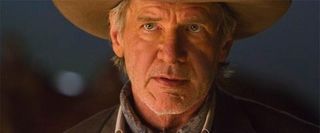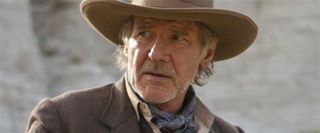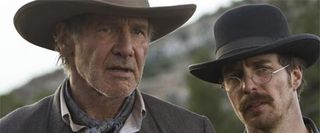Interview: Cowboys & Aliens' Harrison Ford

I honestly contemplated not writing an introductory paragraph for this interview. How many people out there don’t know about the legendary Harrison Ford? How many people saw the headline and said to themselves, “Who is that?” In movies and TV you always here presenters say, “And now a man who needs no introduction.” Harrison Ford is that man, but I’m going to do it anyway.
Those that have been paying attention know that I was given the chance, along with a small group of other journalists to travel to Missoula, Montana a couple weeks ago to talk with the cast and director of Cowboys & Aliens. Below you’ll find the roundtable interview I took part in with Harrison Ford, in which the actor discusses how he came to the project, the effect of shooting outdoors, and whether or not nostalgia plays a part in his project choices. Check it out!
I’m always curious how specifically projects come to people and what their initial reaction is, and specifically something like this where the title is so much of the surface with other questions within. What was your process coming on-board a project and, in your way, love it, for lack of a better word?
Well, I told my agent that, one of these days, I wanted to be in a movie that people wanted to go see. One that appeals to what's left of the movie audience. He said, "I've got one," and he said that the title was "Cowboys & Aliens". I read about 30 pages and said, "I don't get it. I don't think that there's anything in this for me." He said, "Well, I thought you were into doing a movie that people wanted to go see." I said, "Alright, I'll finish it," and I read the rest of it. It was ambitious, I thought. I said, "Why don't I go talk to Jon?" and then I met with Jon Favreau. I was impressed by what he had to say and his collegial spirit. I met the writers and they made it clear that it was still a work in progress. I met Daniel [Craig], who was very generous about sharing a bit more space for the character. Then I began to see an opportunity to play a different kind of character than I'm used to. To enjoy the pleasures of having a character where you don't have to have anybody like you. It's a chance to really attempt to bring in some texture to the piece. I had a great time. So I said, “I'm in. This should be fun.” And it was.
After a couple roles where you’re doing a lot of typing, a lot of sitting, was it good to literally saddle back up and get on the literal and figurative horse?
It's nice to get some outside work. That was fun. It was a beautiful location. It was altogether a pleasure. I had a great time. Santa Fe was quite beautiful.
They talked about how your character would be the villain of the piece if the aliens didn’t come in, but my sense of him was that he had this really resolute sense of doing what was right and that was it. Were you working with that at all?
CINEMABLEND NEWSLETTER
Your Daily Blend of Entertainment News
Well, it was certainly a point of reference. I think that in the original script there was a lot more about his military career and his suitability to lead this party because he had a strategic understanding of warfare. I think we rightly sloughed off more of that and a little bit of his relationship with his son and how he treated people and perhaps focuses a bit more in his disappointment in his military experience and what happened at the end. I thought it was very cleverly parsed out so that you didn't just sit down and have a chat about where he comes from and what he's like and why he's the way he is. We see his behavior in various situations that the audience gets to participate in rather than listen to. Which is the key, to me, to good screenwriting.
It was nice that there wasn’t that kind of expositional scene for showing that backstory, but can you talk about the key to tackling the challenge of showing an experienced character and displaying all of their history in their actions and how they treat other people in the present time or during this crisis?
I don't know if I can talk about it [laughs]. I think I can do it, maybe, given 60 days or so to work it out.

You tell that story to the kid and it’s just one story, and it’s not a big story but there’s a lot of information there. And there’s also the line of “If you call me Colonel, you must not know me very well.
Men that called me that are mostly dead [laughs]. The writers were wonderfully collaborative and engaged and so was Jon. Every day we knew where the choke points were coming up ahead of us and I think we probably talked about it every day. "I was thinking today or last night I was thinking, blah blah blah". Everybody was working on it.
I noticed that Adam Beach has a scar on his chin too that’s very similar to yours. I thought that was a fun connection.
You mean you think he was in a fast car crash, too? No, first of all I wanted him to represent the reality of a western experience. He's the richest man in town. He's the most powerful man in town. He's arrogant. He's contentious. There's no sign of Mrs. Dollarhyde. She must have fled a long time ago. His son sort of reflects his inadequacies as a father. So those moments with the boy are of particular importance. The references went in all directions. For me, that's just a great opportunity. You don't want to hit it too hard, because it's a movie about cowboys and aliens. But if it can be there and it can have a real emotional reality, that's part of the pleasure of going to a movie.
But as a follow-up, you have a great scene with Adam Beach and a big emotional farewell; meanwhile, people are out there dying. Do you find it rare to find scripts that combine that kind of character with that kind of action? Do you not see that terribly often?
I don’t think anybody sees that very often. This is a very original concept. I think that the recipe for this allowed, it was an ambition of the writers and Jon from the very beginning to have a textured, layered experience for the audience as well as…Cowboys & Aliens is kind of a good joke, but you sit down, the lights go out and you gotta get way past that and start getting into something else, because that’s some poor version of Men in Black. You have to attend to both the myth of the west and the reality of the west, you have to talk about relationships, because this is about going and getting back our kin, getting back our people who have been snatched away. And what does that mean to a guy who treats his kid like shit anyway? Does it mean that he recognizes that this is unfinished business, that this is bad business and that he’s got another chance at it? And then the other young boy gives him an opportunity to explain himself to somebody. I don’t know, it was complicated and it was interesting. Jon chose wonderful actors and I had great pleasure working with all of them. It’s fun for me.

There’s a lot of talk about nostalgia and bringing a sense of nostalgia to movies currently for an audience. Jon mentioned a scene earlier where Daniel Craig’s character jumps on one of the alien space crafts is sort of a similar moment in that Vic Armstrong stunt in Indiana Jones where he jumps on the tank. I’m wondering if there’s a sense of nostalgia of action/adventure that drives you to this film as well.
Nope. [laughs] I’m in it for the money. [laughs] It’s my job and I love making movies and I love being part of good movies. I love working with ambitious people, and nostalgia doesn’t enter into it for me.
I heard you bought your horse, is that true?
I bought my horse and I bought Daniel’s horse.
That was nice of you.
Well, the horses are still debating. [laughs] But they have a nice place to live now and they don’t have to work every day.
Was the fact that you were shooting in New Mexico a factor, instead of being in a green screen room for months on end?
Certainly I anticipated it’d be nice to be outside but being outside means not being home, so it was a give and take on the whole thing. But I enjoyed being there. I liked the area away from Santa Fe a lot more than I did…it’s kind of like Disneyland in the desert there. But the country’s beautiful and you feel what you should feel in that empty space. At a certain point there was talk about doing this thing in 3D and it was rejected, as you can see. But I’m glad that it didn’t turn out to be a 3D movie because that sense of place is really important. It goes a long way towards explaining people’s need to depend on themselves and crunch up against each other to see who had the most capacity to affect the situation they found themselves in. It was a tough world and an empty place and you had to depend on yourself and the people around you. I think that’s expressed in the anamorphic scale of the way the movie was shot. There’s something real important about that and it’s the iconography of the western. You have all that space and you can still see other people’s faces.
You spoke earlier about this character being a new kind of character for you to play. I’m wondering what, if anything, you learned from the process of creating Dollarhyde.
I don’t think there’s any anything…you can learn the violin when you’re eight years old and then you just keep practicing. You want to keep your chops. The process is the same always. It’s creating behavior to help tell the story, understanding the utility of the character to the story overall and then efficiently attending to all of that and try and bring as much life and texture and reality to the situation. It might not be real for an audience if they didn’t recognize human behavior and emotions in that context.

How important is historical backstory to you? When you’re creating a character do you spend more time with his inner-workings or did you study Antietam, or wherever he fought?
I wanted to know the history, I certainly did want to study Antietam and I wanted to make sure we had those references correct, and, in fact, we did make some corrections to that. Yeah, it’s important for me to just know what I’m talking about, tuck that in. I don’t have to do a sense memory [laughs] I just need to know what I’m talking about. And I thought it was important to know about why he was not going to turn this over to somebody else, not going to depend on somebody else. I think the line is, I think it’s still in the movie, is “I’m not going to turn this over to some guys who have to telegraph Washington.” The audience might find a little pleasure in that even today.

Eric Eisenberg is the Assistant Managing Editor at CinemaBlend. After graduating Boston University and earning a bachelor’s degree in journalism, he took a part-time job as a staff writer for CinemaBlend, and after six months was offered the opportunity to move to Los Angeles and take on a newly created West Coast Editor position. Over a decade later, he's continuing to advance his interests and expertise. In addition to conducting filmmaker interviews and contributing to the news and feature content of the site, Eric also oversees the Movie Reviews section, writes the the weekend box office report (published Sundays), and is the site's resident Stephen King expert. He has two King-related columns.
Most Popular



